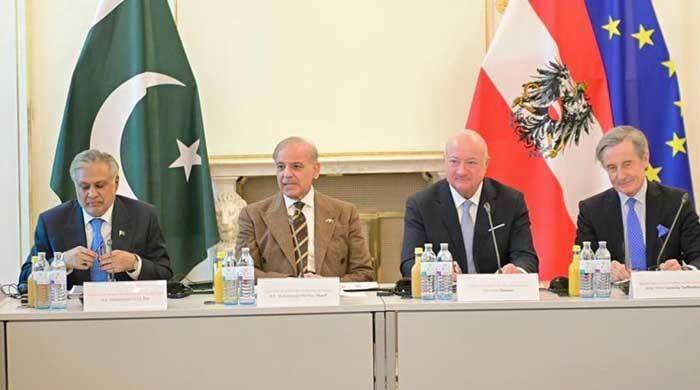Pakistan to begin next coronavirus vaccination phase from March, says Dr Faisal Sultan
In the second phase, people above 65 years of age will be vaccinated, he says
February 18, 2021
- In the second phase, people above 65-years of age will be vaccinated, says Dr Faisal Sultan
- Pakistan will receive 2.8 million AstraZeneca-Oxford vaccine doses in March
- Over 52,000 frontline healthcare workers have been vaccinated across Pakistan
Special Assistant to the Prime Minister on Health Dr Faisal Sultan said Thursday that Pakistan would begin its next vaccination phase from March, with the arrival of the AstraZeneca-Oxford vaccine.
Addressing a press conference in Islamabad, the prime minister's aide said that people above 65 years of age would be given the AstraZeneca-Oxford vaccine that Pakistan is set to receive through the COVAX facility.
The special assistant said that till March, Pakistan would receive 2.8 million doses of the vaccine. "This is a positive development as we will be able to kick-start our second phase."
Read more: Russian vaccine Sputnik V to be provided only to large hospitals, says Pakistani importer
He said that the government had announced on February 15 that people above 65 years of age should start registering themselves for the vaccine.
Procedure
The procedure is the same, send your CNIC number — without dashes — at 1166. "You will get further information from the message you receive."
He said that the World Health Organisation has approved it and that nearly 35 countries are using it, including the United Kingdom. "It is a safe vaccine."
He urged people above 65 years to get themselves registered for the vaccine as they are "an important part of the society".
Read more: Asad Umar urges frontline healthcare workers to register for coronavirus vaccine
The special assistant said that the vaccine that is being used to inoculate the frontline healthcare workers is from Sinopharm, adding that he "recommends that it should not be used for people above 60 years."
"It does not mean that this vaccine is not safe or is not effective," he said, adding that the people who partook in the vaccine's trials were not substantial, therefore, Pakistani medical experts advised that it should be used when enough data for people above 60 is available.
Over 52,000 frontline healthcare workers vaccinated
Furthermore, he said that more than 52,000 frontline healthcare workers have received the coronavirus vaccine across Pakistan.
He said that the government considers the frontline healthcare workers as "ideals" — and it proves the vaccine's efficacy and their trust in it.
Read more: Pakistan starts registration of citizens over age of 65 for COVID-19 vaccination
Speaking about the procedural changes made in registering for the vaccine, he said that if a frontline healthcare worker is less than 60-year-old, then they will now only have to send their CNIC number — without dashes — at 1166 and visit their nearest vaccination centre. The list is available on the National Command and Control Centre's website.
From February 22, the general healthcare workers would be able to register themselves through a website, and they will be able to receive the vaccine at their respective vaccination centres.
Pakistan is also one of the first countries that plans to allow the private sector to conduct vaccinations and the drug regulator issued guidelines on Thursday for private companies to set up centres to administer COVID-19 vaccines.
The private sector has an integral role in terms of ensuring safe and secure COVID-19 vaccinations in addition to the pubic sector, the drug regulator said in a notice announcing the guidelines.
"The standard operating procedures (SOPs) are being developed for AVCs (Adult Vaccination Counters) in order to ensure (a) smooth vaccination process," it said.
Last week, the country allowed the commercial import and sale of vaccines without price caps, in contrast to most countries, which are importing and administering vaccines through government channels.
The guidelines say private firms will be responsible for identifying and enlisting prioritised people for vaccination, monitoring, surveillance, management, communications and cold-chain management.
The firms will ensure training of nurses and skilled staff in vaccine administration, infection prevention and control, and use of recording and reporting tools on prescribed formats.
The centres will share daily reports with government health management teams.
— Additional input from Reuters











